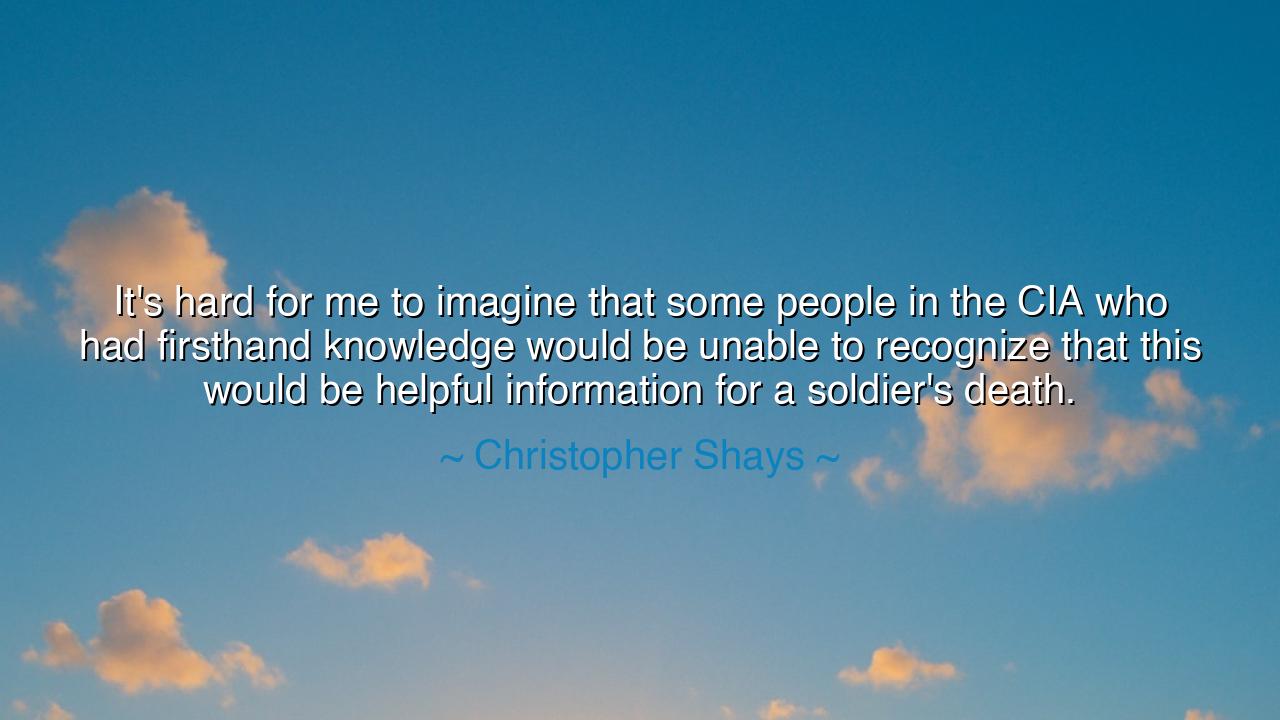
It's hard for me to imagine that some people in the CIA who had
It's hard for me to imagine that some people in the CIA who had firsthand knowledge would be unable to recognize that this would be helpful information for a soldier's death.






“It’s hard for me to imagine that some people in the CIA who had firsthand knowledge would be unable to recognize that this would be helpful information for a soldier’s death.”
Thus spoke Christopher Shays, a man of conscience and reason, whose words burn with the sorrow of truth delayed and the pain of duty betrayed. In this statement, he gives voice not merely to frustration, but to a moral wound — the disbelief that those entrusted with knowledge and power could fail to act when the life of a comrade hung in the balance. It is a cry that echoes through the ages: how can those who know remain silent? How can truth, which might save a life or ease a family’s grief, be withheld in the name of secrecy, fear, or convenience?
When Shays speaks of his “imagination” struggling to comprehend such inaction, he does more than lament bureaucracy — he grieves for the loss of integrity that shadows the halls of power. The Central Intelligence Agency, charged with safeguarding the nation through information, embodies a paradox: it knows much, yet must conceal much. But Shays reminds us that knowledge carries moral weight, and the possession of truth is never neutral. To know something that might prevent death or bring justice, and yet to remain still, is to bear a burden of guilt that time itself cannot wash away. His words cut deep because they speak not of policy, but of human responsibility — the sacred duty to act when others cannot.
The origin of this quote lies in Shays’s work as a U.S. Congressman investigating the failures of communication and accountability in matters of national security. He was not a man content with hollow reports or polished speeches; he sought truth for the sake of the living and for the honor of the fallen. In this particular statement, his outrage emerged from revelations that intelligence agencies had withheld information relevant to the death of American soldiers — information that, if shared, might have altered outcomes or at least brought clarity to their sacrifice. In his disbelief, one hears the ancient lament of those who serve justice: that truth, though sacred, is too often hoarded like treasure by those sworn to share it.
To understand his grief more deeply, we might recall the tale of Sophocles’ Antigone, the daughter of Oedipus who defied the king’s decree to bury her brother. She said, “I was born to share in love, not in hatred.” Like Antigone, Shays calls us to remember that the duties of the state must never eclipse the duties of the heart. When institutions place secrecy above compassion, or power above truth, they become shadows of their purpose. The failure to act upon knowledge is not only a failure of governance — it is a moral failure, a betrayal of the human spirit. The death of a soldier is not only a statistic; it is a life entwined with others, a story cut short. To withhold what might have shed light upon that loss is to dishonor the courage with which that soldier lived.
The heart of this quote lies in the eternal tension between knowledge and conscience. Knowledge is strength, but strength without compassion becomes cruelty. The wise have long warned that the possession of truth demands moral clarity — for truth is like a sword: it can defend the innocent or destroy the just. Shays’s words remind us that in every age, there are those who hide behind walls of authority, claiming safety in silence. Yet silence in the face of suffering is complicity. The greater the knowledge, the greater the responsibility to use it with mercy and courage.
History has shown us the cost of silence. Recall the tragedy of Chernobyl, where officials, fearing shame and reprisal, delayed revealing the extent of the nuclear disaster. In those lost hours, countless lives were darkened by radiation, and trust in human institutions was poisoned as surely as the air. Those who knew but did not act stood condemned not by enemies, but by their own inaction. So too, in Shays’s lament, we hear the same lesson: that truth withheld for a day can cost lifetimes of pain. The soldier’s death, like all sacrifices made in service, demands not only remembrance but honesty — the full and fearless telling of what was known, when it was known, and by whom.
Therefore, O reader, take this teaching to heart: never let knowledge slumber when it can serve life or justice. Do not fear truth, for it is the foundation upon which every noble act must rest. Speak when silence tempts you, share when secrecy shames you, and act when inaction would betray another’s trust. The soul that holds truth and yet withholds compassion builds its own prison; but the one who speaks, though trembling, walks in freedom and light.
For as Christopher Shays reminds us, knowledge divorced from conscience is blindness wearing a crown. Let your knowledge, great or small, serve the living. Let it ease pain, bring understanding, and uphold the dignity of every human life. In this way, even amid the failures of men and the shadows of power, your truth will become a light that does not fade — a light worthy of those who gave all, and of the truth they deserved to know.






AAdministratorAdministrator
Welcome, honored guests. Please leave a comment, we will respond soon